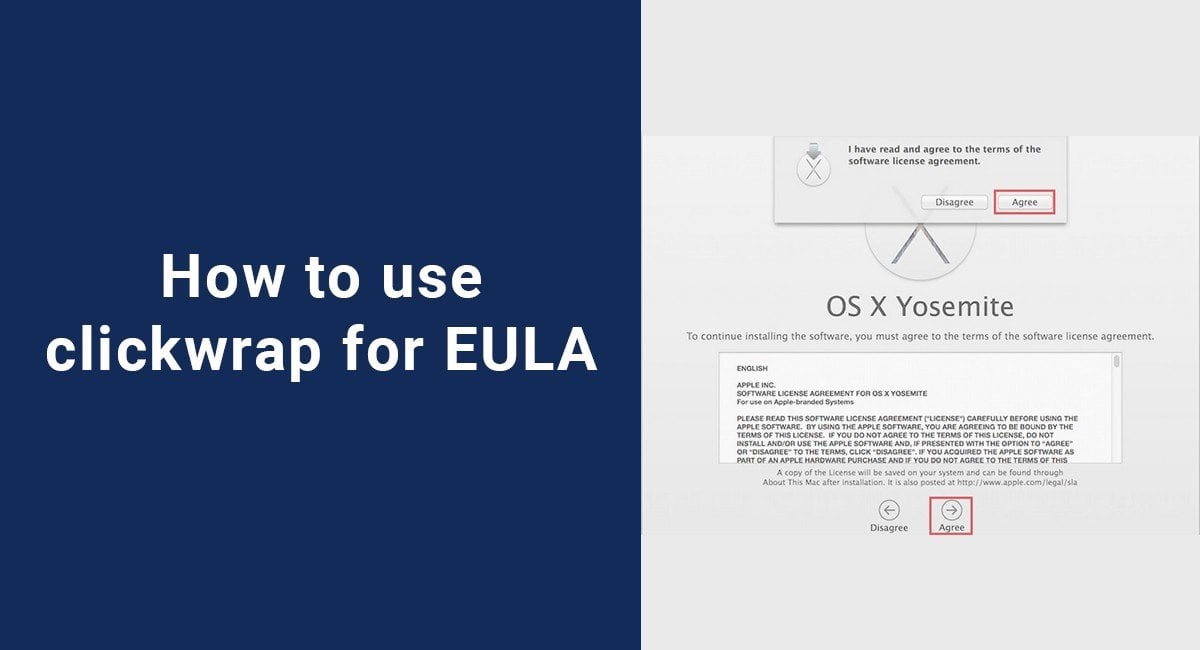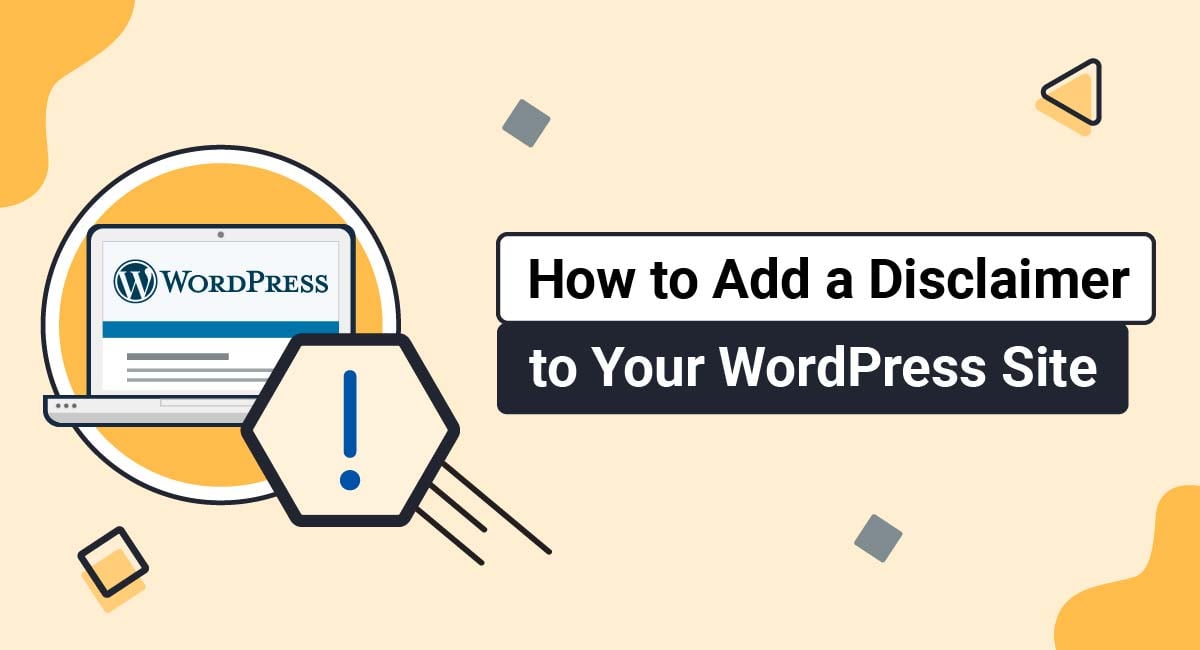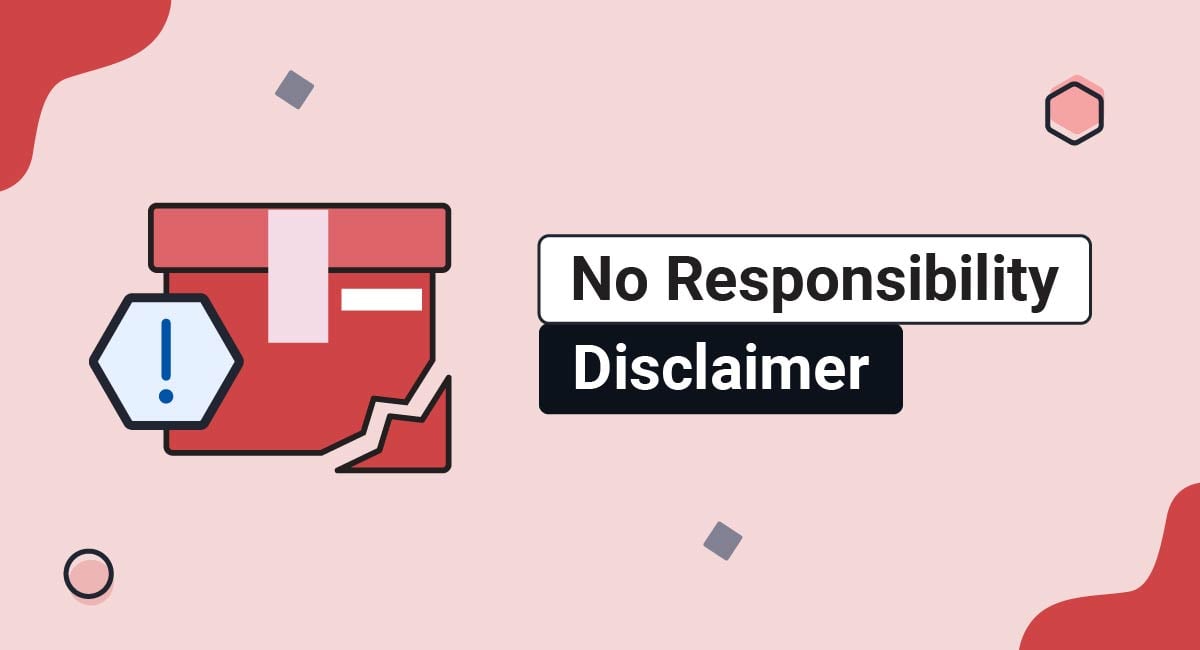Legal agreements can help educate your users and protect your business. Understanding the differences between common legal agreements is essential in determining the right agreements for your business.
This article explains the differences between common legal agreements, including Terms and Conditions agreements, Privacy Policies, End User License Agreements (EULA), Cookies Policies, and disclaimers. It explains whether each agreement is legally required and covers the key features of each agreement.
TermsFeed is the world's leading generator of legal agreements for websites and apps. With TermsFeed, you can generate:
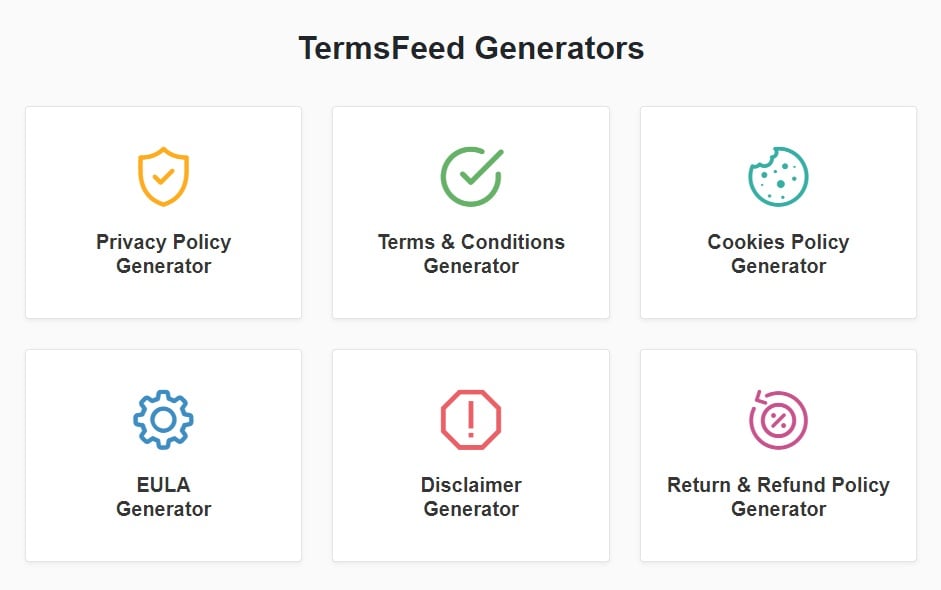
- 1. What are the Differences Between a Cookies Policy and a Privacy Policy?
- 1.1. Is a Cookies Policy Legally Required?
- 1.2. Is a Privacy Policy Legally Required?
- 2. What are the Differences Between a Privacy Policy and a Terms and Conditions Agreement?
- 2.1. Is a Terms and Conditions Agreement Legally Required?
- 3. What are the Differences Between an EULA and a Terms and Conditions Agreement?
- 3.1. Is an EULA Legally Required?
- 4. What are the Differences Between Disclaimers and Other Legal Agreements?
- 4.1. Are Disclaimers Legally Required?
- 5. Summary
What are the Differences Between a Cookies Policy and a Privacy Policy?
While both a Cookies Policy and a Privacy Policy address how you handle users' personal information, a Cookies Policy is specifically about your use of cookies.
A Cookies Policy is a document that explains what cookies are, why your business uses them, and how users can adjust their cookie preferences.
Cookies are small files that are stored on users' devices. They are commonly used to remember users' visits to a website and for targeted advertising (advertising based on users' online behavior) and analysis purposes.
A Cookies Policy typically includes the following clauses:
- Description of cookies. This section of your Cookies Policy explains what cookies are.
- What cookies you use. This clause explains the types of cookies you use, (such as necessary cookies to keep a user logged in when using your website or advertising cookies to track users' online activities for marketing purposes).
- Why do you use cookies. You should explain your reasons for using cookies, such as to remember users' shopping cart or account info or for targeted advertising purposes.
- How to manage cookies. This clause describes how users can adjust their cookie preferences.
A Privacy Policy is a legal document that explains how you handle users' personal information and how users can exercise their rights. Personal information is data that can be used to identify an individual, such as names, addresses, and financial and health information.
Most Privacy Policies include the following clauses:
- What information you collect. This clause explains the types of personal information you collect or process.
- Why do you collect personal information. This section describes your reasons for collecting or processing personal information.
- Third parties you disclose personal information to. You should let users know the types of third parties you share personal data with.
- What personal information you share with third parties. This clause lists the categories of personal data you share with third parties.
- How you keep personal data safe. This clause explains the security measures you take to protect users' personal information.
- How users can exercise their privacy rights. You should list users' privacy rights and explain how they can exercise those rights.
- Your contact information. Your Privacy Policy should include a way for users to contact you with questions concerning their personal information.
To help demonstrate the differences between these two legal agreements, consider the following examples.
The European Commission's Cookies Policy page contains information about what cookies are, how it uses cookies, third-party cookies, and how users can manage cookies:
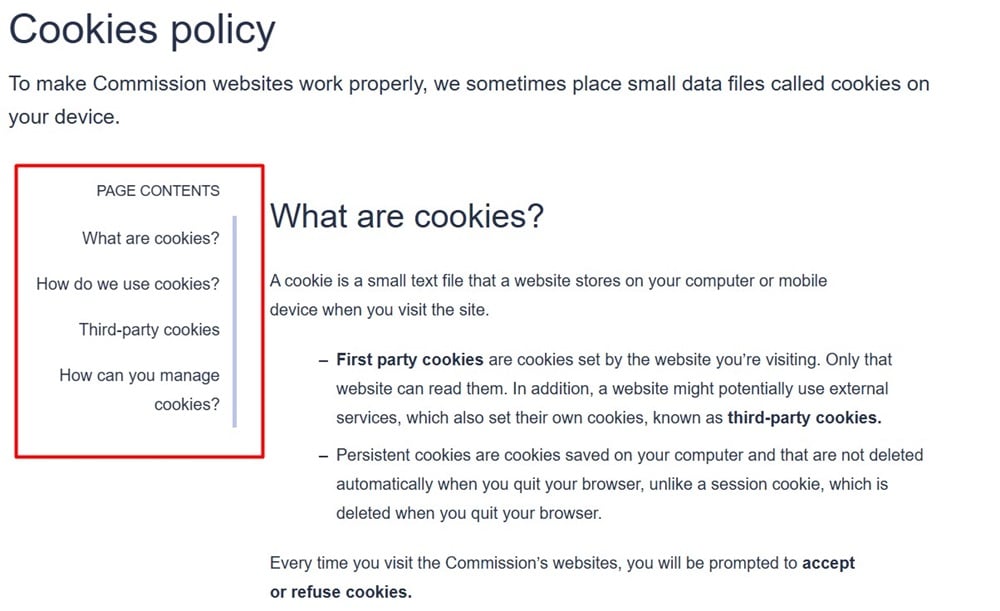
In comparison, the table of contents for Meta's Privacy Policy shows that the document is much broader in scope and covers the types of information it collects, how it uses and shares that information, and how users can exercise their rights, among other privacy-related subjects:
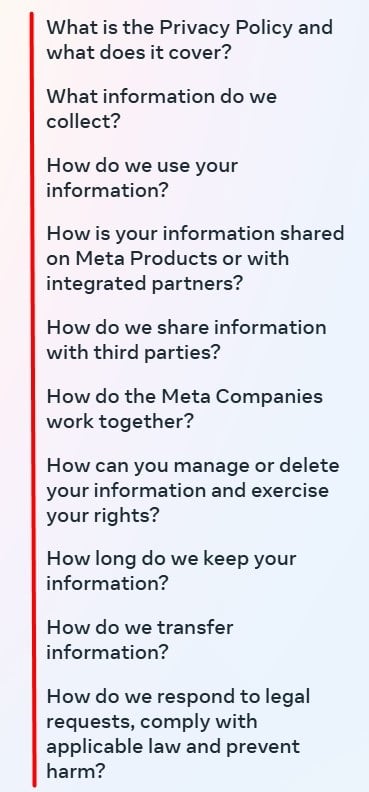
A Cookies Policy can be a standalone document, or you can include it within your Privacy Policy. Maintaining a standalone Cookies Policy can make it easy for users to find information about your use of cookies without having to scroll through your Privacy Policy to find it.
Stripe's Cookie Policy functions as a standalone document and lets users know they can find definitions of certain terms within its Privacy Policy:
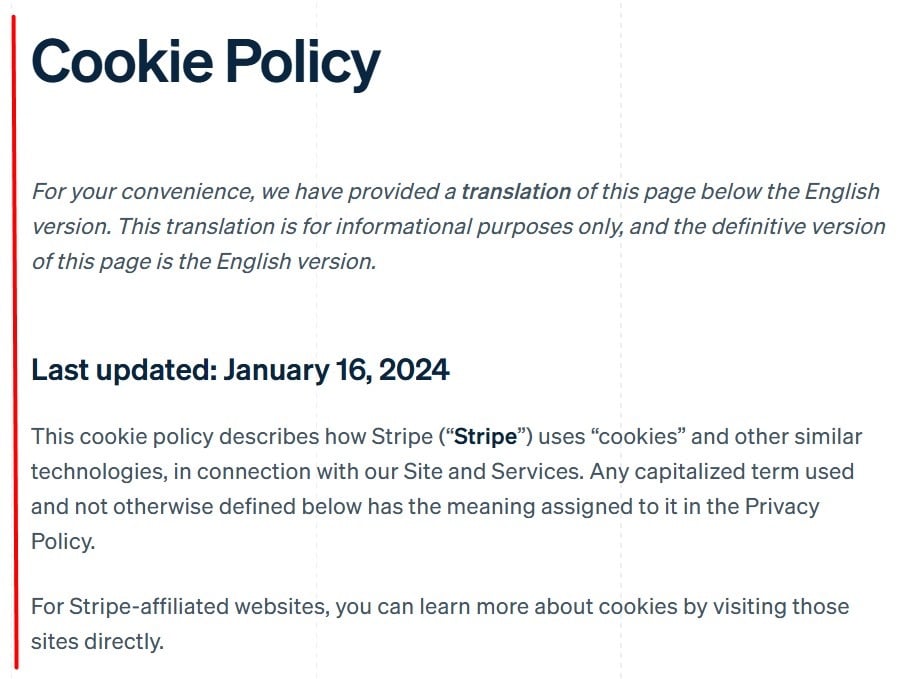
Scribd includes information about its use of cookies within its Global Privacy Policy:
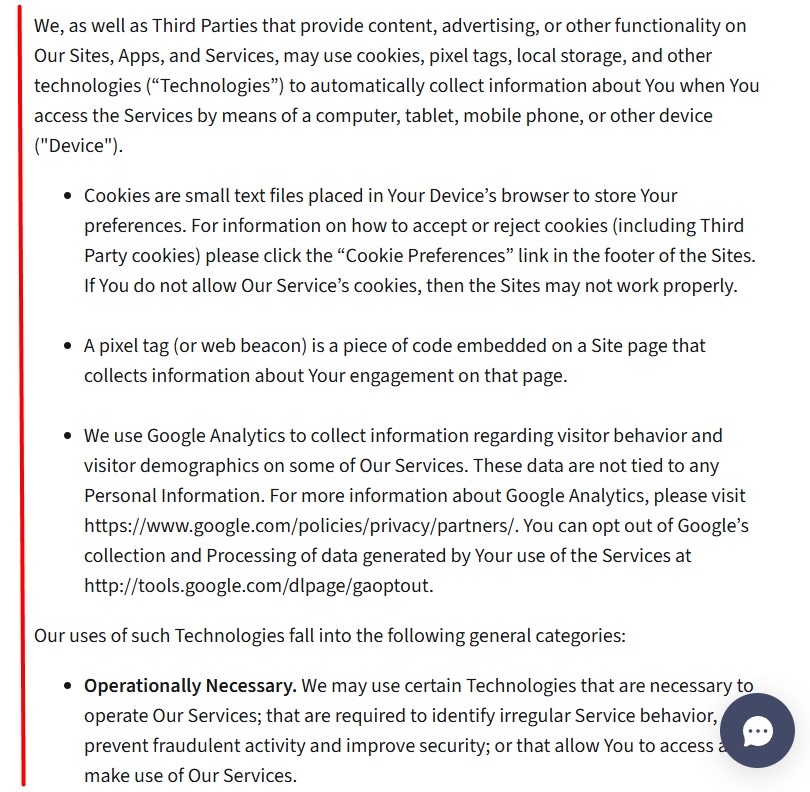
Is a Cookies Policy Legally Required?
There are no laws that specifically require businesses to have a Cookies Policy. However, there are laws (such as the GDPR and the EU's ePrivacy Directive) that require applicable businesses to notify users about how they use cookies. Maintaining a Cookies Policy can help you comply with these requirements.
Is a Privacy Policy Legally Required?
Many state and global privacy laws require organizations that meet their criteria to maintain a Privacy Policy on their websites and apps.
Just a few of the many laws that may require you to have a Privacy Policy include:
- The European Union's (EU) General Data Protection Regulation (GDPR)
- Canada's Personal Information Protection and Electronic Documents Act (PIPEDA)
- The California Consumer Privacy Act as amended by the California Privacy Rights Act(CCPA/CPRA)
- The Virginia Consumer Data Protection Act (VCDPA)
The requirements of data protection laws vary, but in general, if you collect or process consumers' personal information, you should have a Privacy Policy.
What are the Differences Between a Privacy Policy and a Terms and Conditions Agreement?
The main difference between a Privacy Policy and a Terms and Conditions agreement is that a Privacy Policy explains how you handle users' personal information, while a Terms and Conditions agreement lets visitors know the rules they must follow to use your product, service, website, or app.
Another significant difference between a Privacy Policy and a Terms and Conditions agreement is that many jurisdictions require businesses that collect or process users' personal information to maintain a Privacy Policy on their websites, while a Terms and Conditions agreement is not legally required.
A Terms and Conditions agreement (also called Terms of Use or just Terms) is a document that explains the rules that consumers must follow in order to use your product, service, website, or app. It will contain clauses about topics such as expected and restricted behaviors, grounds for termination, and limitations of liability, but the agreement should be customized to represent your business's unique needs.
Common Terms and Conditions agreement clauses include:
- Acceptable use. This clause explains that users are agreeing to use your product, service, website, or app in accordance with your conditions of use.
- Payment information. You should explain payment details, such as how payments are processed or when subscription services are billed.
- Restricted behavior. This clause lets users know what kind of behavior is against your rules, such as abusing other users or copying or sharing content without permission.
- Termination. This clause explains the grounds for termination and can inform users that you can terminate their access to your product, service, website, or app at will.
- Limitations of liability. This section lets users know the limits to what you will be held legally responsible for.
- Dispute resolution or arbitration information. This clause explains the process for resolving disputes.
For instance, Spotify's Privacy Policy includes clauses specific to personal data, while its Terms of Use agreement contains information about customers' use of its service, intellectual property rights, and dispute resolution:
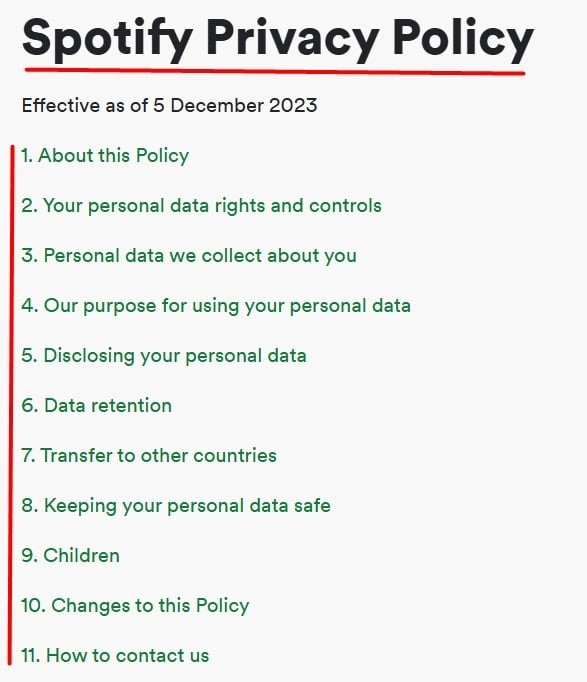
The introduction of Spotify's Terms of Use also contains a link to its Privacy Policy so that users can easily access information about how it uses their personal data. You can also see in the table of contents of each of Spotify's agreements that each covers very different things:
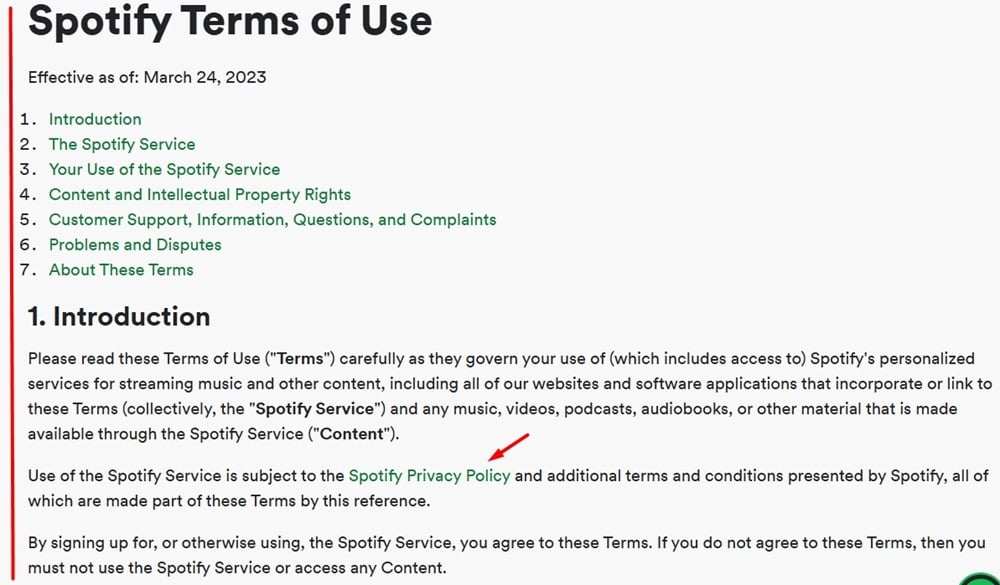
Is a Terms and Conditions Agreement Legally Required?
A Terms and Conditions agreement is not legally required. However, it's still a good idea to have a Terms and Conditions agreement, as it serves to communicate your conduct expectations to your users and can help provide legal protection for your business.
What are the Differences Between an EULA and a Terms and Conditions Agreement?
An EULA and a Terms and Conditions are similar in that they describe the rules users must follow to use your products or services.
An EULA (End-User License Agreement) is an agreement between a software developer or publisher and anyone who wants to use their software. It grants users the right to use your software and explains the rules they must follow, while a Terms and Conditions agreement lists the rules users must agree to in order to use your product, service, website, or app.
An EULA often includes the following information:
- Scope of the software license. This section explains what kind of license is being granted and the rules for using the software.
- Licensing fees. This clause lets users know of any applicable licensing fees or taxes.
- Intellectual property information. An EULA should explain who owns intellectual property rights including copyright, trade secrets, and trademarks, as well as what intellectual property laws may apply to the software.
- Warranty disclaimer. A disclaimer of warranties explains that the software is available "as is."
- Limitation of liability. This clause informs users that the software developer or publisher will not be held legally responsible for any damages or harm that results from use of the software.
EULAs and Terms and Conditions agreements often contain comparable clauses, including information about limitation of liability, warranties, disclaimers, and restricted behaviors.
However, a Terms and Conditions agreement is typically more expansive and covers topics beyond software licensing, such as payment and subscription details, dispute resolution, refunds, and privacy concerns. Some businesses include their EULAs within their Terms and Conditions agreements.
For clarity, let's look at the table of contents for Oracle's EULA, which includes sections on the scope of its license, restricted uses of its software, and indemnification for intellectual property infringement cases, among other information:
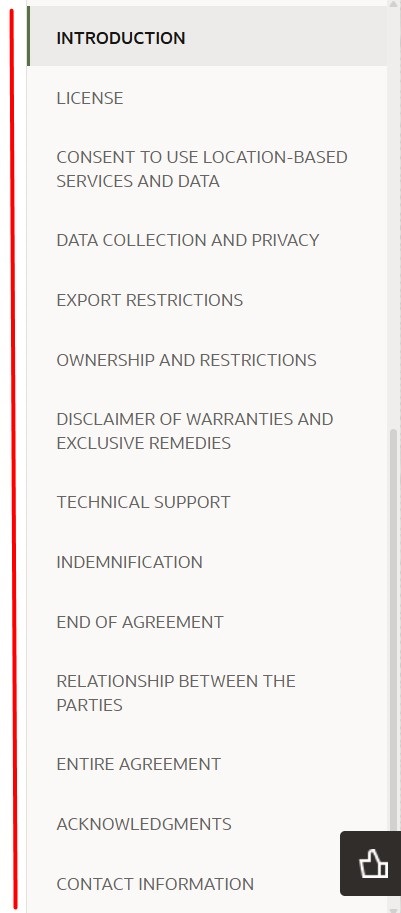
The table of contents for Etsy's Terms of Use agreement includes clauses about acceptance of its terms, its other legal documents (including its Privacy Policy), restricted use of its services, grounds for termination, and its dispute resolution process, among others:
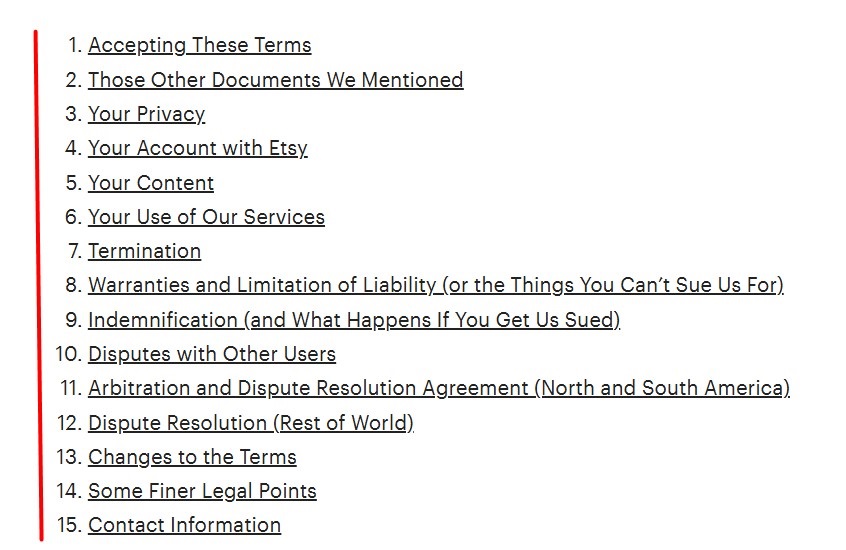
While the clauses in the above documents are similar, Oracle's EULA addresses the use of its software, while Etsy's Terms of Use agreement explains what users need to know when using its websites, apps, and services as a whole.
Software developers and publishers who wish to grant a license to consumers to use their software should have an EULA, while other types of businesses that want users to understand the rules of using their product, service, website, or app should maintain a Terms and Conditions agreement.
However, if you are providing users with licenses to use your software, it's a good idea to have both an EULA and a Terms and Conditions agreement. The EULA serves to grant and cover the terms of the software license while the Terms and Conditions agreement can help regulate user behavior on your website or app.
Blizzard Entertainment's Legal page contains links to its legal documents, including its EULA and its Terms of Use agreement for its websites:
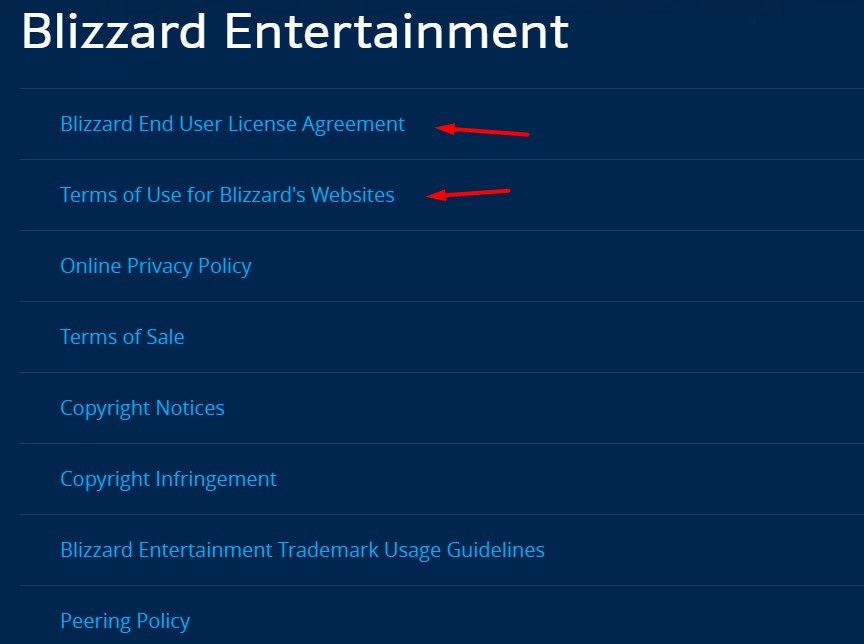
Is an EULA Legally Required?
There are no laws requiring software developers and publishers to have an EULA.
Although not legally required, providing your customers with an EULA can help ensure they know the rules for using your software and gives you the right to revoke their license if necessary.
What are the Differences Between Disclaimers and Other Legal Agreements?
The main difference between disclaimers and other legal agreements is that disclaimers are statements that can help limit your liability, while Terms and Conditions agreements, EULAs, Privacy Policies, and Cookies Policies are comprehensive documents that are broader in scope and are more likely to be legally binding.
Disclaimers are statements that provide information to your users and help limit your legal liability. They can stand alone on your website, or they can be part of another legal agreement, such as a Terms and Conditions agreement or an EULA.
Common disclaimers include:
- Errors and Omissions. This disclaimer informs users that your business is not responsible for any harm that may occur due to mistakes or errors on your website or app.
- Past Performance. You should let users know that any testimonials about the past performance of your product or service should not be considered a guarantee of future results.
- Affiliate Links. This disclaimer/disclosure lets users know that your website mentions affiliate products or services or includes affiliate links for which you may be compensated.
- Views Expressed. This disclaimer lets users know that the views expressed in any particular piece of content on your website are those of the author and not necessarily shared by your business.
- Use At Your Own Risk. You should use this disclaimer if your website shares information or advice that could potentially cause users harm.
- Medical. Anytime you offer health-related content or advice you should use a medical disclaimer to let users know that it is not a substitute for medical treatment from a healthcare provider.
Here's an example of a Nutrition Disclaimer that lets users know that the accuracy of the nutritional information for recipes is not guaranteed:

Are Disclaimers Legally Required?
Most disclaimers are not legally required, but there are some laws that require them in certain cases.
For example, the Federal Trade Commission (FTC) requires businesses that get compensated for promoting a third party's product or service to maintain affiliate disclaimer/disclosure on their websites.
An affiliate disclaimer/disclosure can be used to inform users that the business may be compensated if the user clicks on an affiliate link or that it may earn income from affiliate products or services it mentions on its website.
If you engage in affiliate marketing, you should display an affiliate disclaimer/disclosure on your website where users can easily find it.
Outforia includes an easily accessible link to its Affiliate Disclaimer in its website footer:

When users click on the link, they are taken to a separate page that explains that Outforia may receive compensation when users click on certain third-party links on its website:
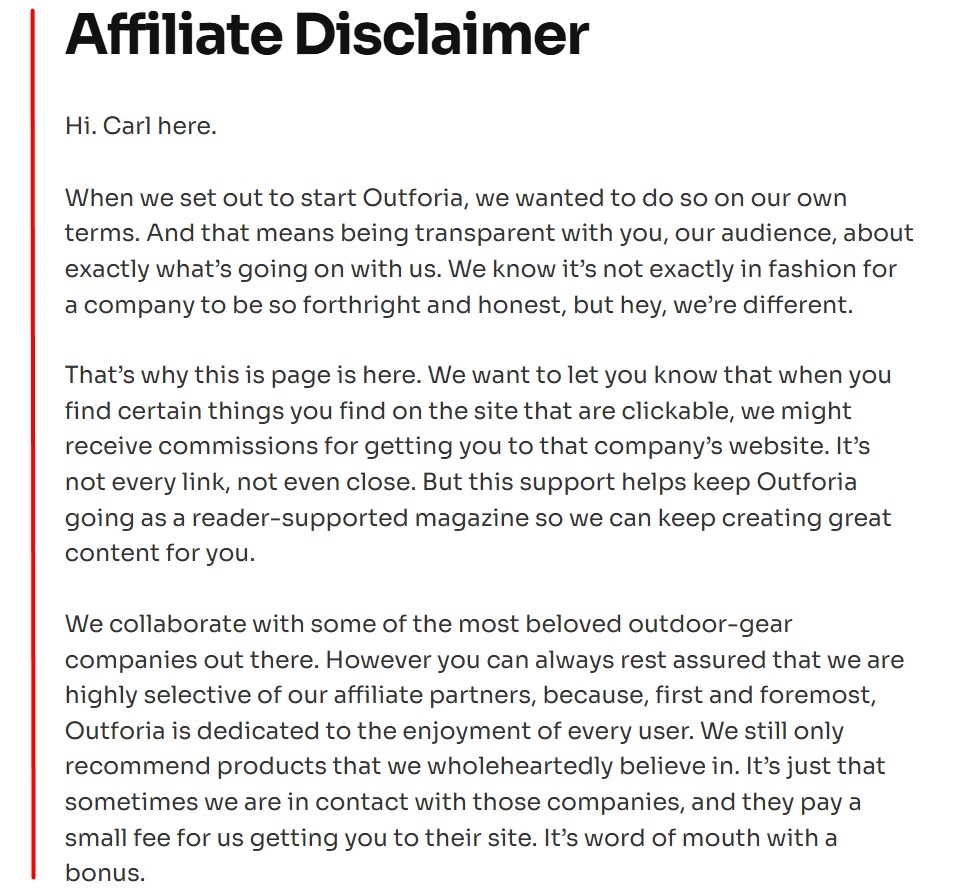
Summary
A Terms and Conditions agreement is a document that outlines your and your users' rights and responsibilities. It is not legally required.
A Terms and Conditions agreement often contains information about:
- Acceptable use
- Payment and subscription details
- Restricted use
- Termination
- Limitations of liability
- Dispute resolution
A Privacy Policy is a legal document that describes how you handle users' personal information and how they can exercise their privacy rights. Many state and global data protection laws require applicable organizations to maintain a Privacy Policy on their websites and apps.
Privacy Policies often contain the following clauses:
- The types of personal information you collect and/or process
- Your reasons for collecting and/or processing personal information
- The categories of third parties you share personal information with
- What personal information you disclose to third parties
- How you keep personal information secure
- How users can exercise their rights
- Your contact information
The difference between a Privacy Policy and a Terms and Conditions agreement is that a Privacy Policy explains how you collect and process personal information and how users can exercise their privacy rights, while a Terms and Conditions agreement lets users know what they must agree to in order to use your product, service, website, or app. A Privacy Policy is often legally required while a Terms and Conditions agreement is not.
An EULA is an agreement between a software developer or publisher and a software user. It gives the user a license to use the software. There are no laws requiring businesses to have an EULA.
Common clauses in an EULA include:
- Scope of the software license
- Licensing fees
- Intellectual property information
- Warranty disclaimer
- Limitation of liability
The difference between an EULA and a Terms and Conditions agreement is that an EULA grants users a license to use your software and explains the rules for using the software, while a Terms and Conditions agreement is more extensive and explains user expectations for using your product, service, website, or app.
A Cookies Policy is a document that explains the types of cookies you use, your reasons for using them, and how users can control cookies on their devices. A Cookies Policy is not legally required, but it can be used within a Cookie Consent Banner to help businesses comply with laws like the GDPR and the ePrivacy Directive.
A Cookies Policy should contain the following information:
- Description of what cookies are
- The types of cookies you use
- Your reasons for using cookies
- How users can control cookies
The difference between a Cookies Policy and a Privacy Policy is that a Cookies Policy describes how you use cookies and a Privacy Policy explains how you treat users' personal information and how they can exercise their privacy rights.
Disclaimers are informative statements that help limit your legal liability. Disclaimers are not typically legally required, but there are some laws (such as the FTC Act) that require disclosures in certain cases.
Common types of disclaimers include:
- Errors and Omissions
- Past Performance
- Affiliate Links
- Views Expressed
- Use At Your Own Risk
- Medical
The difference between disclaimers and other legal agreements is that disclaimers are informative statements that help limit your liability, whereas legal agreements such as Terms and Conditions agreements, Privacy Policies, EULAs, and Cookies Policies are more comprehensive documents that are more likely to be legally binding.

Comprehensive compliance starts with a Privacy Policy.
Comply with the law with our agreements, policies, and consent banners. Everything is included.



